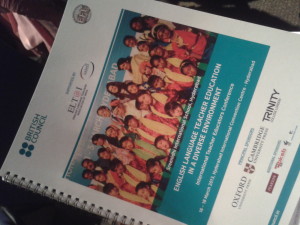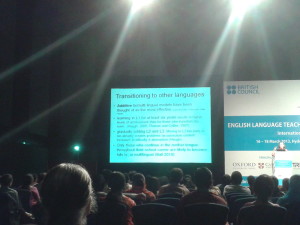The English Language Teacher Education in A Diverse Environment
International Teacher Educators Conference
16th-18th March 2013, Hyderabad
The conference aimed to address a pressing policy issue for the Government of India, consequent upon the adoption of the Right to Education Act in 2009: The need to introduce inclusive classroom practices and the culmination of restrictive and discriminatory classroom practices. This, based on the NCF ruling that “Schools need to be centres that prepare children for life and ensure that all children, especially the differently-abled children from marginalized sections, and children in difficult circumstances get that maximum benefit of this crucial area of education’.
It having been said that classrooms are a collection of diverse individuals; English language teacher educators need to be skilled in managing diversity. The bigger question that looms in front of us is ‘how’?!
The first quote I heard at this conference was “The task of a modern educator is not to cut down jungles, but to irrigate deserts. (C.S. Lewis). What followed this statement was a lengthy discussion of all the problems we face in the education system; inconsiderate texts, lack of strong pedagogic practices, unsuitably skilled teachers` lack of resources, methods that are trapped in ages long gone, lack of governmental and policy oriented support, and so many more issues that have cropped up. Then came another question- Are we ready for the challenges? The emphatic answer said volumes; “NO!”
And thus began the learning at the conference.
For the better part, all the sessions I attended had speakers who agreed on certain key points. One of them simply put was this- Teaching in a classroom is a linguistically and culturally diverse setting. So we’re talking about different languages, differing socio-economic backgrounds, varying levels of parent participation, varied levels of intelligent and ability and aptitude, different mother tongues/ first languages, castes/communities, maturity, motivation, interest….and the diversity and kinds of diversities keep adding up. This already to me seemed like a bleak and disadvantaged situation. And the one thought that I had in my head that I could not shake was the Government Primary School that Bookworm works with in Taleigao. This place to me was the one available standard of “diversity” at its best (its also a multi grade classroom!) As we discussed the issues of teaching in these kinds of classes they all seemed to fit a framework of questions that had now created itself in my head. How does one provide learning for all? What and from where does one get the suitable materials? What is the appropriate way to maintain discipline in these classes? How can one maintain interest, keeping in mind that too simple and the older ones get frustrated and too complex, and the younger ones get phased out? How is assessment supposed to happen and based on what criteria? In a class that is; in the bigger picture’ diverse, how is learning to reach students at individual levels? And each of these points seemed so pertinent and relevant, and in some cases so familiar to me. And that’s when I started wanting the answers.
I will not say that I didn’t get any answers. An overarching answer that came to us was “We can teach some of the students, some of the time, some of the students most of the time, but not all of the students all of the time.” There were more practical answers too; that seemed feasible, given some thought. In a session called Teaching Large Mixed Level Classes: Some Practical Principles, given by Penny Ur. She put it quite succinctly- If you can’t keep the children motivated, you can’t keep them in class. And then she proceeded to tell us that the simplest ways to keep motivation levels high was to keep variation and interest as predominant features of a classroom. The guessing and anticipation of what’s to come and making the lessons interesting and in some way more “game like”, use of more visual materials, open ending questions that elicited no necessarily right or wrong answers; was a definite way to keep students gripped to the classroom happenings.
Another positive way to keep children engaged would be to ‘reach’ the individual. While this is notably a difficult task, giving learners some control over the task and their involvement would increase their sense of the task being individualized. Furthermore, letting the students express in an accepting environment their preferences for certain activities over others. Collaboration is also a very useful concept in task performance. Giving students activities that would promote brainstorming and group would also create an enthusiastic and competitive spirit in the class.
The last of her suggestions included that as educators; we should try and provide for learning at different levels. This involves structuring tasks that are more open ended. This so, as it works favourably with students who are at a higher level of cognition, and may also prove to be non-taxing for students who are at a lower level of cognition.
It surprised me to learn that in an average class, 10-15% of students have specific learning disabilities that go undetected. Furthermore, in a learning situation, a child who is ‘behaving’ differently may be displaying a special need and more often than not, we end up addressing the behaviour rather than the need. For me, this added to the staggering list of diversities already prevalent in a classroom. A startling statement that caught my attention stated- Including kids with special needs in a class is just evolving good teaching practices. And that set a new standard in my head to work towards.
Another issue that was highlighted through the course of the conference was the debate on whether or not English is the language we should be pushing for in classrooms across the country. This statement in itself raised my own queries to the surface and this, I admit is a question that still remains unanswered and has not left the space it occupies at the back of my mind. My own questioning leads me to wonder if given the fact that; whether we like to admit it or not; English has a certain amount of hegemony in society; we should bring it into our classrooms as early as possible. And then there’s the other side of my own argument that is dissatisfied with the concept of negating the linguistic diversity of the county and the luxury of a child to pick his/her own first language as a medium to learn in. Further strengthening this side of my internal debate is wondering what happens when students in classrooms are required to do an exam/ learn/ study/ process in a language that is not their first language. Would not a child experience boredom and soon enough frustration?! What is the position of a child who may know a response, but is unable to transact it in a different language? And right on cue, I thought of myself attempting to remember a Telugu response to a question that I was tutored to respond to just that morning, and it failed me.
Now there’s a piece of information that I was not aware of. It states that learning in a first language until even the sixth grade, improved the cognitive ability of a child to be bi/multi lingual in later life. And then I localized my thoughts to Goa; the singular state that does not leave the child the luxury of studying in a language other than English beyond the 4th grade. What is the fate?
At a point of time during this conference, I was glad that the medium we work with is storybooks. Simply because it’s not an inconsiderate text. Its easily accepted and processed by kids. It makes for the luxury of children relating to what their hearing. The question of disinterested learners is significantly reduced using this medium. Its easier to make efforts to be culturally relevant. And kids love books!
Someone smartly said that monolingualism is curable! For now, I do not know how long a mass revolution and revamp of the system will take. It’s true we have a long way to go. It was said innumerably that s start of this revolution would be to better equip people who are in training to become educators. So that’s where I’ll start…getting better equipped.




